Today, I’m going to show you how to get into consulting.
In this comprehensive guide, I’ll cover:
What you need to know about the consulting industry and what to expect when interviewing with top consulting firms such as McKinsey, BCG, or Bain & Company
How to build meaningful connections with consultants
How to craft a consulting resume and cover letter that stand out
How to ace your fit and case interviews
And lots more.
So, whether you are a recent graduate or an experienced professional, you’ll love this guide if you want to secure a consulting job at a top consulting firm.
Let’s get started.
Table of Contents
Step 0: Understand the Consulting Industry (What You Need to Know to Land A Job)
In this chapter, I’ll cover the fundamentals of the consulting industry, including what management consultants do, the key skills consulting firms look for when interviewing candidates, and the recruitment process they use.
I’ll also show you the salaries you can expect as a management consultant and the exit opportunities you’ll have after leaving the consulting sector.
Finally, you’ll find out if consulting is your right career choice.
Understand what consultants do
Management consultants are professional problem-solvers.
In other words, management consultants’ work consists of solving their client’s most pressing problems.
To do so, consulting firms provide various services, including market entry and corporate strategy, operations management, digital transformation, and organizational performance.
For instance, a firm like McKinsey might help a global retailer restructure their supply chain to enhance efficiency. In contrast, a firm like BCG could assist a leader in the Energy sector in developing a growth strategy (how to increase revenue or profit).

Besides the large variety of consulting services, top consulting firms serve clients across many industries.
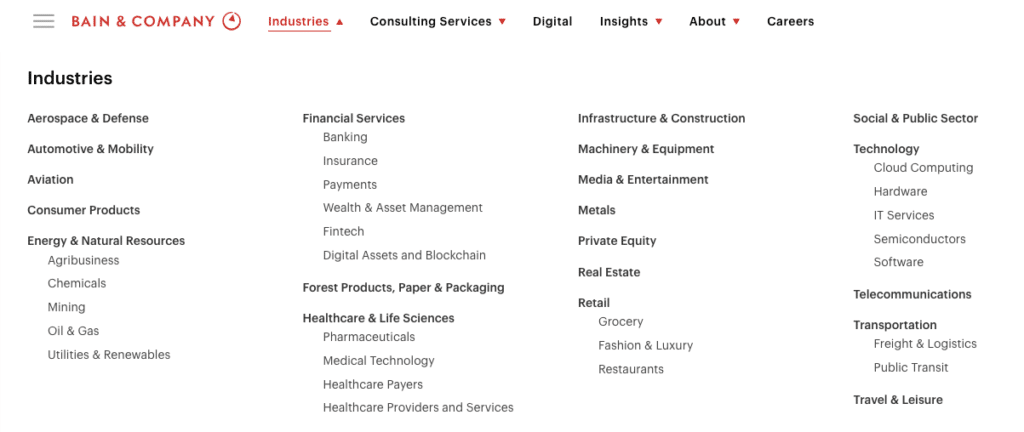
The variety of projects (i.e., problems to solve) they’ll be working on is why most candidates want to pursue a career in consulting (among other reasons).
And this is true: there is no routine or typical day as a management consultant.
Finally, you’ll work for international clients, another perk of being a management consultant.
Key Skills Management Consulting Firms Seek in Candidates
Management consulting firms such as McKinsey, BCG (Boston Consulting Group), and Bain & Company look for specific skills in their candidates.
These include strong analytical and quantitative capabilities, excellent problem-solving skills, effective communication and interpersonal skills, and the ability to work well in teams.
Additionally, candidates must demonstrate a keen understanding of business dynamics.
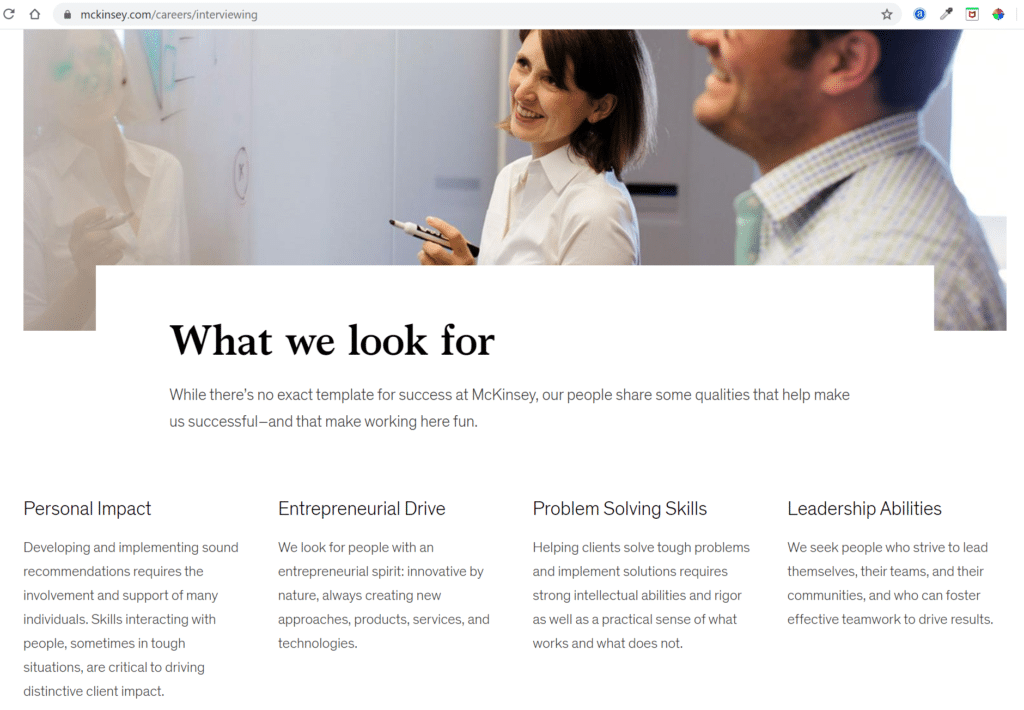
In addition, leadership potential and a proven track record of success, whether in academic, professional, or extracurricular activities, are also highly valued.
For example, demonstrating how you led a team to achieve a significant outcome in a past project can prove your fit for management consulting.

Consequently, your goal throughout the management consulting hiring process must be to demonstrate that you possess these skills, particularly problem-solving skills and personal characteristics.
Overview of the Management Consulting Hiring Process
Check out the following comprehensive guides:
The rigorous hiring process in management consulting typically involves a resume and cover letter screening phase, a problem-solving test, and multiple rounds of interviews.
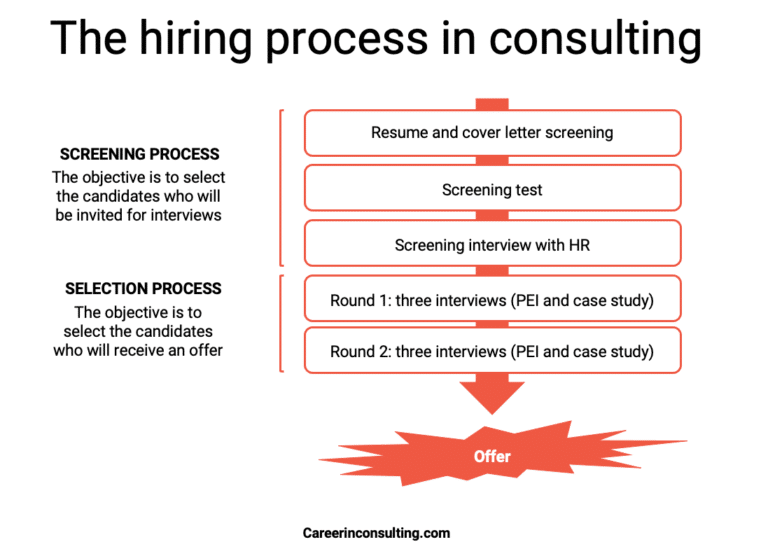
However, interviews at top management consulting firms are not typical job interviews.
It includes case interviews that assess your ability to solve business problems and behavioral interviews that evaluate your personal qualities and professional experience.
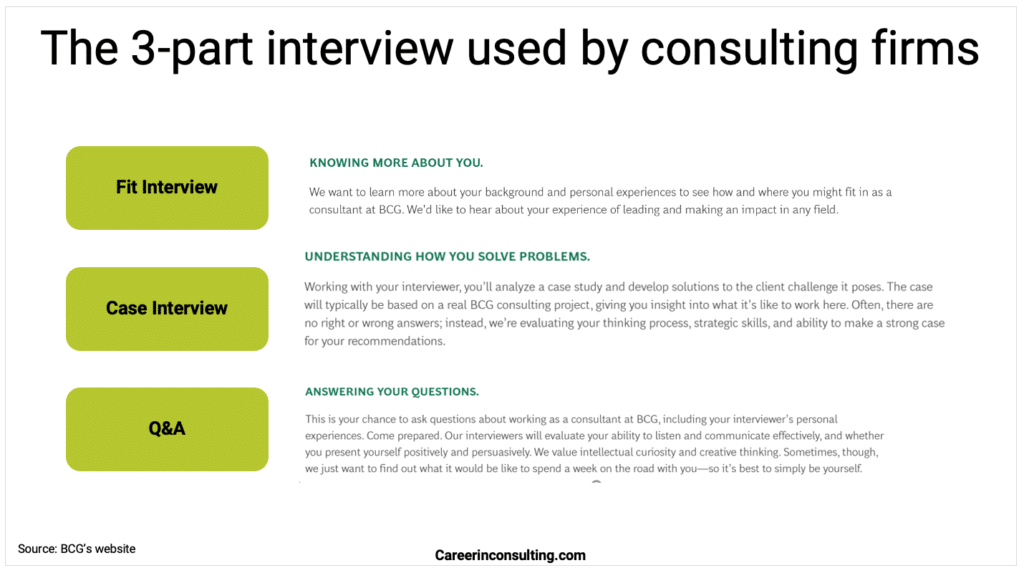
A case interview (also known as a case study interview) is a problem-solving interview.
You’ll be asked to solve a consulting business problem in 30 minutes or less.
The goal?
Assess your problem-solving abilities, data analysis and numerical skills, business acumen, and communication skills.
In other words, it assesses your capacity to do the job as a management consultant.
Note: you don’t need management consulting experience to apply for consulting jobs.
Insight into Consulting Salaries
Related article: Read this article to get a detailed breakdown of salaries in management consulting.
Consulting salaries can be pretty lucrative, reflecting the demanding nature of the job and the high-value consultants provide to their clients.
Depending on the firm, management consultants can expect a competitive base salary complemented by performance bonuses, benefits, and sometimes profit-sharing or stock options.
As consultants advance in their careers, their compensation packages grow significantly, especially if they reach partner level, where compensation can include a share of the firm’s profits.
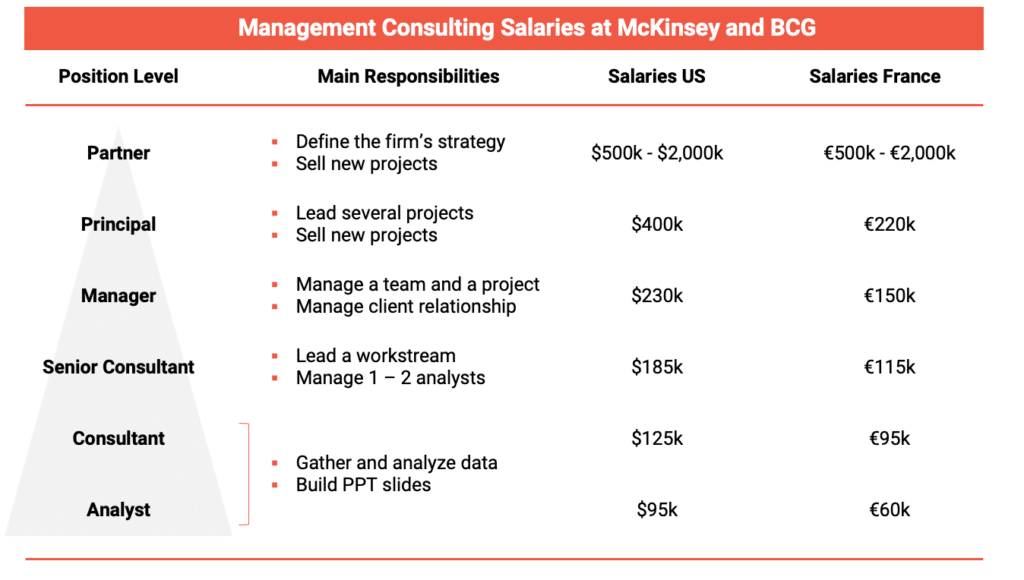
Exploring the Career Path in Management Consulting
A career in management consulting typically follows a progression from junior roles like Analyst or Associate to Consultant, then Manager, and eventually Partner or Director, depending on the firm’s structure.
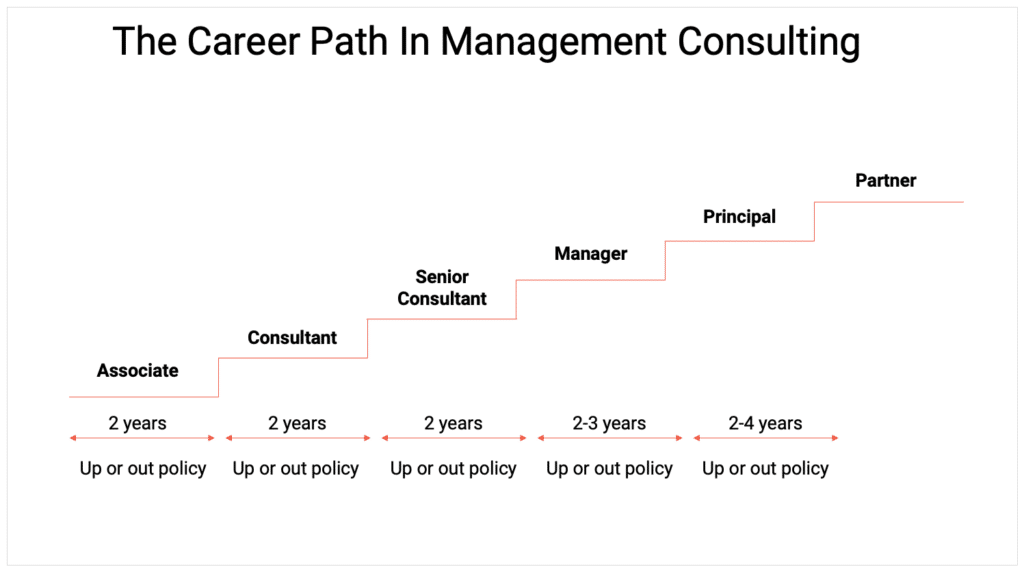
While the more junior roles mainly involve data analysis, each step up the ladder requires increased responsibility for client relationships, finding consulting clients, project management, and team leadership.
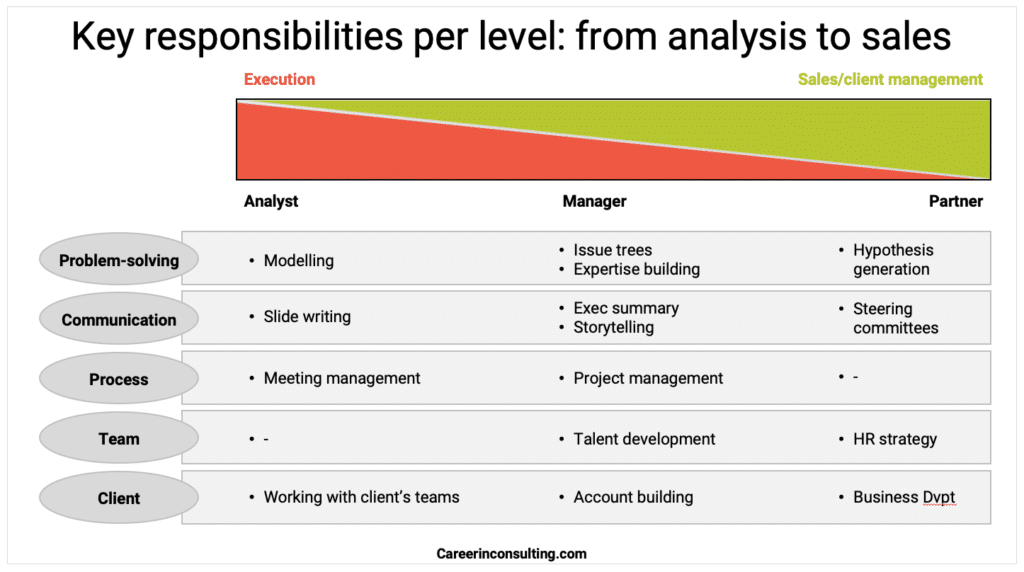
Understanding career progression in management consulting can help you set realistic career goals and plan your professional development accordingly.
Note: many consulting firms have an “up-or-out” policy. This means management consultants with the lowest performance are regularly asked to leave.
Exploring Exit Opportunities After a Career in Consulting
Consulting equips you with highly transferable skills that open doors to high-profile roles across industries.
Key exit opportunities include moving into executive management roles in corporate sectors such as finance, technology, healthcare, and consumer goods.
Examples of successful transitions include:
Corporate Strategy and Development: Former consultants often move into strategy roles, using their analytical skills to shape long-term business strategies.
Private Equity and Venture Capital: Investment firms highly value the rigorous financial analysis skills developed in consulting.
Entrepreneurship: Many consultants leverage their experience in problem-solving and project management to start their businesses.
Non-profit and Government Roles: Consultants passionate about societal impact often move into significant positions within non-profit organizations or government agencies, where they can influence policy and strategic direction.
Finally, many job boards —like LinkedIn— show listings that mention a mandatory experience in management consulting to be eligible for a role.
Evaluating Your Fit in the Consulting Industry
Evaluating whether consulting is the right fit for you involves a realistic assessment of your skills, interests, and professional aspirations.
This includes considering the typical consulting work environment, which often involves high pressure, tight deadlines, extensive travel, and intellectual challenges and opportunities for rapid career advancement.
Reflect on how well your personal goals align with the characteristics and demands of the industry.
To do so, here are some symptoms showing you are a right fit for consulting:
You love solving complex problems
You love working on new topics
You want to make an impact
You enjoy being outside your comfort zone
You like working with intelligent people who challenge your work
You are okay to make concessions about your work-life balance
Conversely, a consulting job might not be for you if:
You don’t want to sacrifice your hobbies and personal life
You don’t perform well under pressure
You don’t want to work on specific topics (e.g., streamlining organizations)
You want (or like) to gain deep expertise about something
By thoroughly understanding these foundational aspects of the consulting industry, you can better prepare yourself for what lies ahead and determine if this challenging yet rewarding career path is right for you.
Step 1: Networking Strategies to Maximize Your Chances
Related article: read my complete guide about networking with consultants here.
Why networking with consultants is important
Networking with consultants is essential for several reasons:
First, it provides insider insights into the consulting industry, offers expert advice on navigating the application process, and can lead to referrals, significantly boosting your chances of landing an interview.
Additionally, networking allows you to practice your interviewing skills, mainly through mock interviews with experienced consultants who can provide critical feedback.
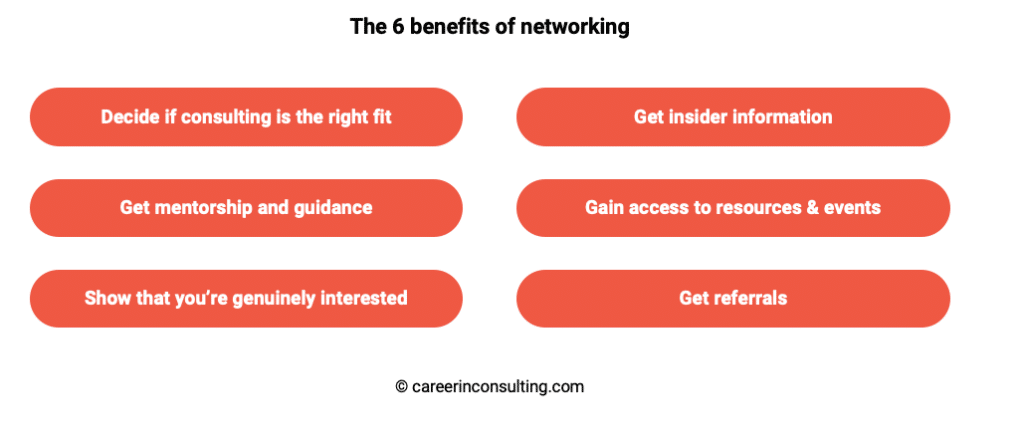
Who to contact
Building relationships with the right people can help you break into consulting and become a management consultant.
This includes partners or consultants at your target firms, alumni from your educational institutions who are now consultants, and speakers or panelists from consulting-related events.
But who to contact?
A best practice is thoroughly researching potential contacts’ backgrounds to find common ground.
Indeed, the more you have in common with someone, the higher your chances of getting a positive response.
Therefore, use LinkedIn (or a database from your Alumni association) to search for management consultants in your desired firm and look for shared connections or interests.
For instance, finding a management consultant who volunteered at the same organization as you can provide a natural starting point for your outreach.
Another strategy is to attend seminars or webinars where management consultants speak, use the Q&A session to ask insightful questions, and then follow up with a connection request mentioning your interaction.
How to approach management consultants to get responses
Your initial approach can make or break the chance of building a productive relationship.
Best practices for reaching out include crafting personalized messages that mention specific details about the consultant’s career that inspire you, clearly stating your intentions for reaching out, and expressing a genuine interest in learning from their experiences.
Additionally:
Keep your initial short: management consultants do not have time to read a 500-word essay.
Do NOT ask for anything except a quick (10 minutes) chat. For instance, you can’t ask a management consultant you contact for the first time to review your CV (true story!).
A first example: Begin your message by congratulating them on a recent achievement or commenting on an article or presentation they’ve made.
This not only shows that you’ve done your homework but also that you value their accomplishments and insights.
A sample message might start like this:
“I recently read your article on digital transformation in healthcare and found your insights on adopting AI particularly enlightening. As someone aspiring to enter consulting focusing on healthcare, I would deeply appreciate any advice you could share about breaking into this niche area.”
Another sample outreach message:

The questions to ask during a networking call
During a networking call, the quality of your questions can demonstrate your understanding of management consulting and your seriousness about joining the industry.
Best practices include preparing a mix of questions about personal experiences, firm-specific practices, and industry perspectives.
For instance, a list of questions can be:
“What was your path into consulting, and what inspired you to choose this career?”
“What do you find most challenging and rewarding in your role at [Firm]?”
“How does [Firm] differentiate itself from other top consulting firms like McKinsey or Bain?”
“Can you describe a recent project you found particularly impactful?”
“What common mistakes do candidates make during interviews?”
“What trends do you see shaping the consulting industry in the next five years?”
“What’s the best career advice you’ve received within consulting?”
“Could you recommend any resources that helped you develop your consulting skills?”
Always send a thank-you note
Sending a thank-you note is not just good manners—it’s also an essential step in building and maintaining professional relationships.
Best practices include sending a personalized thank-you message within 24 hours of your networking call, mentioning specific advice or insights shared during the call, and expressing appreciation for their time and guidance.
Example: Your thank-you note might read, “Thank you for sharing your insights on transitioning from IT to consulting. Your advice on tailoring my resume to highlight analytical skills was incredibly helpful. I look forward to keeping in touch and will update you on my progress.”
Nurture your network
Nurturing your network means actively maintaining and strengthening your relationships with management consultants.
This process involves regular, thoughtful engagement beyond initial contact, fostering a mutual value exchange.
Best practices for nurturing a network include:
Regular Check-ins: Schedule periodic updates to stay in touch with key contacts. This doesn’t have to be formal; a simple email or message updating them on your progress or checking in on theirs can keep the connection alive.
Share Relevant Information: Send articles, studies, or news items relevant to their interests or your shared professional field. This shows that you are thoughtful and staying informed about industry trends.
Celebrate Their Successes: Congratulate your contacts on their professional achievements and milestones. This can include promotions, new jobs, public acknowledgments, or personal milestones like birthdays or anniversaries.
Offer Assistance: Whenever possible, offer help or support to your contacts. This could be by providing feedback on their projects, offering your expertise on a subject, or connecting them with other professionals who could help with their needs.
Engage on Social Media: Like, comment, and share their posts on platforms like LinkedIn. This helps keep your relationship interactive and lets your contacts know you support their professional endeavors.
Invite to Events: Whether virtual or in-person, inviting contacts to relevant events such as webinars, lectures, or networking gatherings can provide a platform for face-to-face interaction and shared experiences.
Step 2: Craft a Standout Resume
Related article: Read my complete guide about writing a consulting resume that passes the screening phase.
In this chapter, I’ll show you how to turn your resume into a consulting resume.
Regardless of your background, I will show you how to create a resume that will pass the screening phase at top consulting firms.
This is more than just saying, “Quantify your achievements” or “Put numbers in your resume.”
Instead, you’ll learn how to write EPIC bullet points.
List all your achievements
Creating a standout resume starts with a comprehensive listing of your achievements.
In other words, list all the moments where you moved the needle.
This includes accomplishments from your academic career, previous employment, internships, and any relevant extracurricular activities.
Here is a list of guiding questions to help you brainstorm:
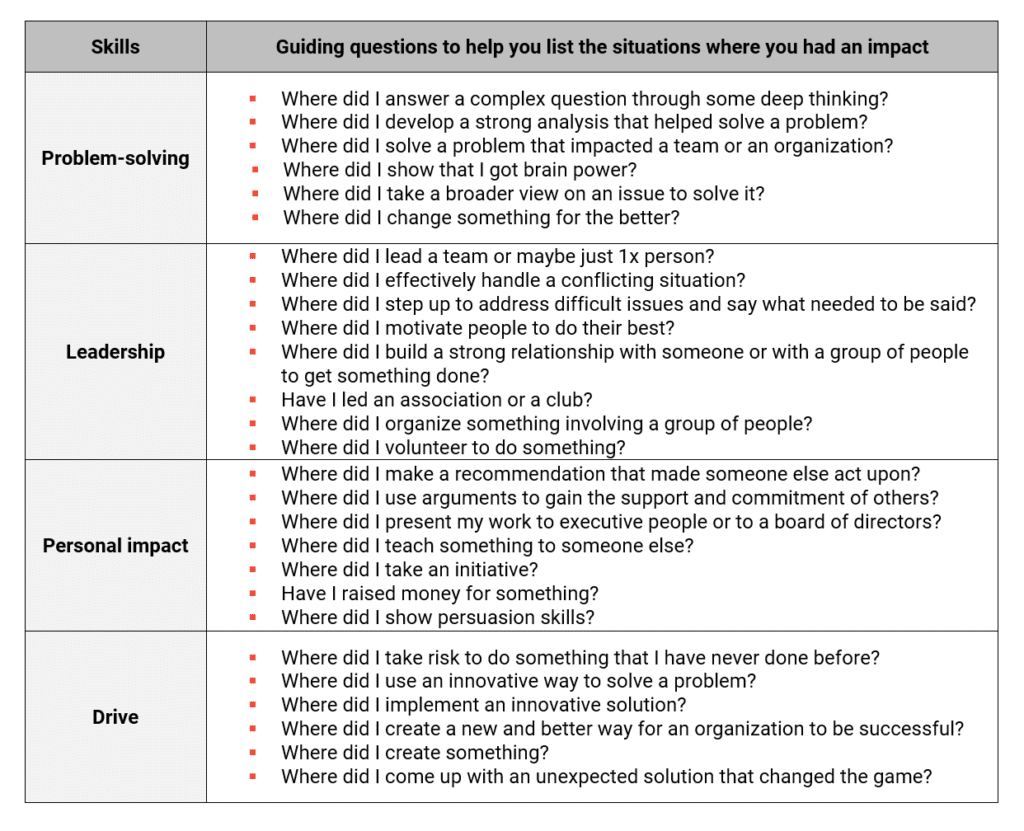
Examples:
If you led a student organization, detail the number of members, the scope of activities, or any notable increases in membership or participation under your leadership.
For professional achievements, mention any recognition you received, metrics you improved, or high-stakes projects you managed.
Turn your achievements into EPIC bullet points
Transforming your achievements into EPIC (Evidence-based, Precise, Impactful, and Concise) bullet points makes your consulting resume stand out.
EPIC bullet points effectively communicate three things to hiring managers:
the problems you had to solve
the consulting skill you used to solve these business problems
the impact of your actions.
The secret of EPIC bullet points lies in how you describe the problems you solved.
For instance, don’t say:
“Analyzed the market and interviewed customers to design new marketing campaigns”.
Instead, say:
“Helped my organization grow its market shares by +3 p.p. in EMEA by conducting an in-depth analysis of the market and designing differentiating marketing assets.”
Do you see why the second example works better?
The second example works better because management consultants can relate to the problem solved by this candidate.
To achieve this while keeping the word count as low as possible, I recommend using the P.A.R. framework:
Another example: Instead of saying, “Managed a team,” specify, “Led a team of 10 in a project that increased revenue by 20% within the first year.”
Add differentiating factors in the Education section
In the Education section of your resume, go beyond listing degrees and certifications.
Since you are competing with candidates with similar educational backgrounds, including differentiating factors can set you apart from these candidates.
Additionally, management consulting firms love candidates with strong educational backgrounds.
I’ve identified seven ways to make the Education section of your consulting resume stand out.
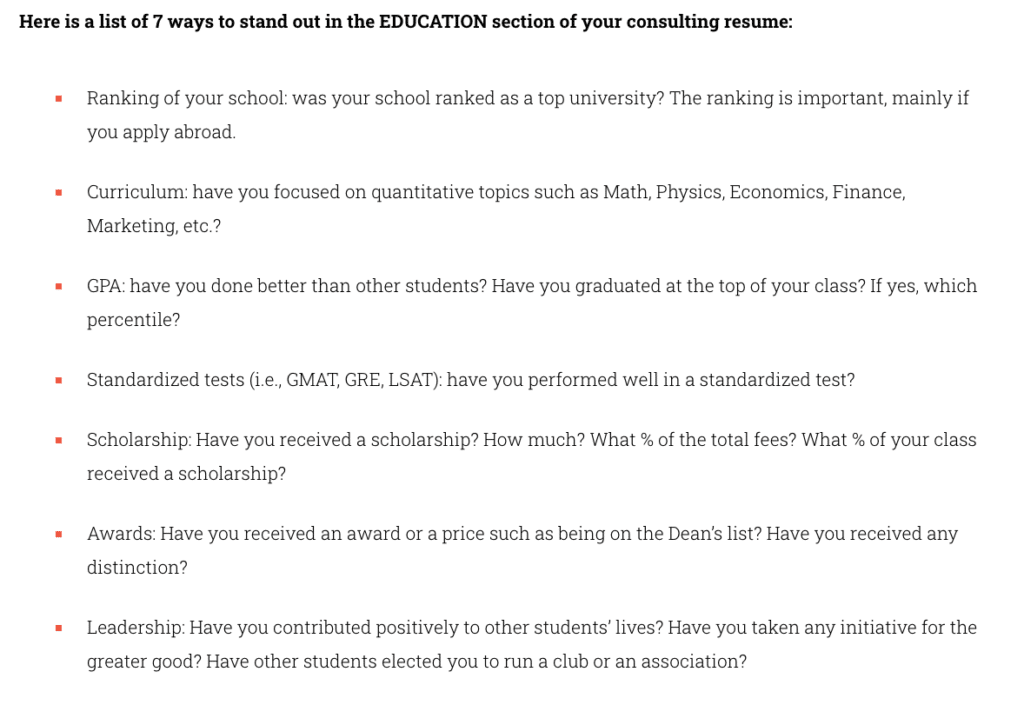
Note: A bachelor’s degree is enough for most offices. However, in some regions, a Master’s degree is mandatory to be eligible.
Examples:
If you participated in a business analytics project or won a case competition, list these experiences to show superior analytical thinking.
For those with a technical background, mentioning data science or statistics courses that apply to business contexts can also be beneficial.
Write an executive summary (optional)
Including an executive summary at the top of your resume can help recruiters quickly understand your background and how it aligns with their firm’s needs.
Best practices include keeping it brief (no more than 3-4 sentences), tailoring it to highlight your most relevant skills, and focusing on how you can add value to the consulting firm.
Example:
“Business analyst with 3 years of experience in the financial sector, specializing in data-driven strategy and operational improvement. Proven track record of delivering projects that reduced costs by up to 25% and increased efficiency.”
Another example:

Get 4 Complete Case Interview Courses For Free

You need 4 skills to be successful in all case interviews: Case Structuring, Case Leadership, Case Analytics, and Communication. Join this free training and learn how to ace ANY case questions.
Step 3: Craft a Standout Cover Letter
Related article: Read my complete guide on writing compelling management consulting cover letters.
So, you’ve just edited your resume.
Well, you are not done with your application yet.
You must write a persuasive cover letter that shows why you are the right candidate and your motivations for pursuing a career in consulting at a specific firm.
Specifically, in this chapter, I’ll show you how to convince management consultants to move you to the interview phase by demonstrating that you possess the right consulting skills and fit the firm’s culture and values.
Let’s get started.
Write a simple introduction
A simple yet effective introduction in your cover letter sets the tone and is your first opportunity to make a positive impression.
Best practices include addressing the hiring manager by name and stating the management consultant position you are applying for.
For instance, a compelling introduction could be:
“Dear Mr. Smith, I am writing to express my interest in the Strategy Consultant position at McKinsey (Dubai office). With a proven background in business analytics and a passion for transformative strategies, I am excited about the opportunity to contribute to your team.”
As you can see from the above example, keep it simple.
You have all the other sections to convince readers to invite you for interviews, starting with “Why you.”
Write a compelling "why you" section
This section of your cover letter should clearly articulate why you are the ideal candidate to become a consultant.
Remember: the interview process is a competition. A consulting company received hundreds of applications yearly for very few job openings.
Therefore, this section must show the readers what differentiates you from other applicants.
Best practices:
Always prove everything: don’t just say that you possess a skill. Instead, use specific examples showing that you have the skills expected from top consulting firms.
Be data-driven (when possible): quantify your successes using metrics.
Think like them: describe the problems you solved like a strategic consultant would do it. Zoom out and explain how your work impacted your company at a C-level. Think strategic objectives.
Example:
“In my previous role at Company X, I spearheaded a project management initiative that reduced project timelines by 30%, directly enhancing client satisfaction rates. My hands-on experience with cross-functional teams gives me a unique perspective that I am eager to bring to your consulting firm.”
Another example that covers 3 consulting skills:
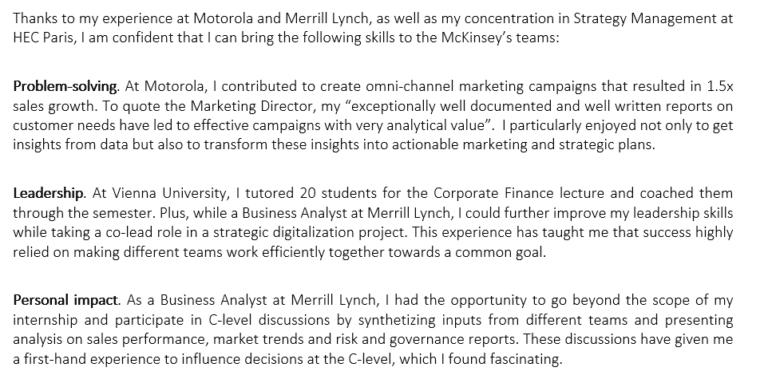
Write a personalized "why them" section
Personalizing your cover letter to the management consulting firm you target is mandatory.
It shows you did some research and have a genuine interest in the position and company.
Never submit a generic (one-size-fits-all) cover letter!
Best practices include:
Mention specific details about the company: its values, culture, or recent projects
Explain why these details are important for you to show them it’s a thoughtful decision
Example:
“I am particularly drawn to BCG’s innovative digital transformation approach and commitment to sustainable business practices. Given my background in developing sustainable business strategies at my previous job, I am well-prepared to contribute to your projects focused on creating long-term value for your clients.”
Write a concise conclusion
Your conclusion should wrap up your cover letter by reiterating your interest in the position and suggesting the next steps.
A well-crafted conclusion leaves a lasting impression and directs the next phase of your application process.
Best practices include thanking the reader for their time, expressing enthusiasm for a potential interview, and indicating your availability to discuss your application in more detail.
Example:
“Thank you for considering my application. I am very enthusiastic about the opportunity to discuss how my background, skills, and enthusiasm align with McKinsey’s goals. I am available for an interview and can be reached by phone or email to schedule a meeting.”
A final note: Many consulting firms say submitting a cover letter is optional. However, I recommend always submitting one.
Step 4: Pass the Screening Tests
Now that you’ve passed the resume and cover letter screening, you can take one of the screening tests used by consulting firms.
These tests assess the essential skills required to become a consultant, including analytical thinking or logical and verbal reasoning.
The objective?
To further reduce the number of candidates who will be invited for interviews.
The exact test you’ll have to take depends on the region and consulting firm you apply to.
Therefore, check with HR which test you will have to pass.
But don’t worry: in this chapter, I’ll list all the screening tests used by consulting firms nowadays.
Understanding the Types of Screening Tests Used by Consulting Firms
Consulting firms utilize a variety of screening tests to evaluate their candidates’ analytical and problem-solving abilities.
These tests simulate the thinking and analysis required in consulting roles, ensuring that candidates are well-suited for the job’s demands and can often be done remotely.
Here’s an overview of the common types of screening tests used by major consulting firms:
1. McKinsey Problem Solving Game: Also known as the Imbellus Game, this assessment replaced McKinsey’s traditional Problem Solving Test (PST). It’s designed to assess a candidate’s decision-making process through game-based scenarios that simulate real-world ecosystems. The game measures how candidates solve problems, manage uncertainty, and prioritize.
2. GMAT-style Tests: Firms like Bain and BCG have used GMAT-style tests focusing on quantitative and verbal reasoning skills. These tests assess a candidate’s ability to interpret data, solve quantitative problems, and comprehend complex written material.
3. Behavioral Assessments: These tests evaluate a candidate’s fit with the firm’s culture and values by exploring their leadership style, resilience, situational judgment, and other personality traits. Questions may revolve around past experiences, hypothetical situations, and choices in specific scenarios.
Each test serves a different purpose, from measuring quantitative analysis skills to understanding a candidate’s psychological and behavioral traits.
You’ll find hereafter an exhaustive list of the tests currently used by consulting firms.
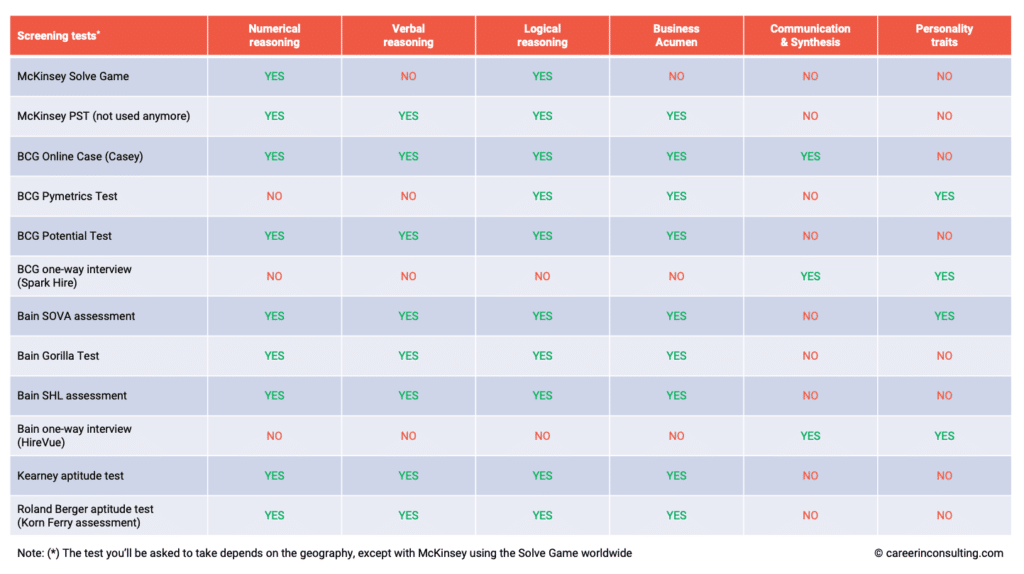
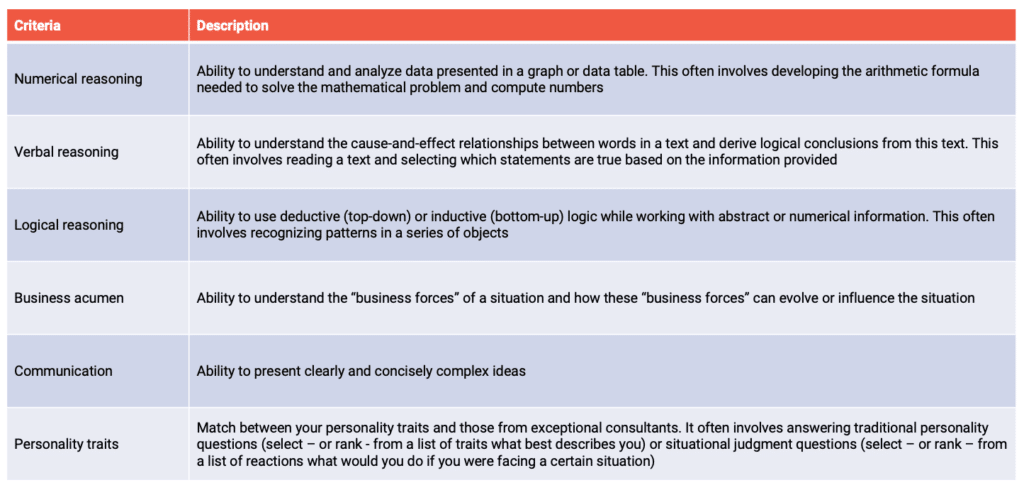
Related articles and comprehensive guides:
Mastering the Bain SOVA test (coming soon)
Mastering the McKinsey Problem-Solving Game
Understanding the McKinsey Problem-Solving Game
The McKinsey Problem Solving Game, or the Imbellus Game or McKinsey Solve, is a unique and innovative assessment tool that evaluates candidates’ problem-solving skills in environments that simulate real-world ecosystems.
The McKinsey Solve assessment involves playing video games centered around ecological themes.
In these games, tasks include building food chains, saving endangered species, managing populations of animals, increasing biodiversity, and sometimes diagnosing diseases in animals or identifying natural disasters.
Participants are typically given 70 minutes to complete two games, with roughly equal time spent on each.
Previously, the standard games were Ecosystem Building and Plant Defence.
However, in Spring 2023, McKinsey began implementing a new version in some areas, replacing Plant Defence with a new game called Redrock case study.
Another critical point is that the Solve games assess the results you achieve and the methods you use to reach them (your “process score”), which significantly affects the best strategy to use.
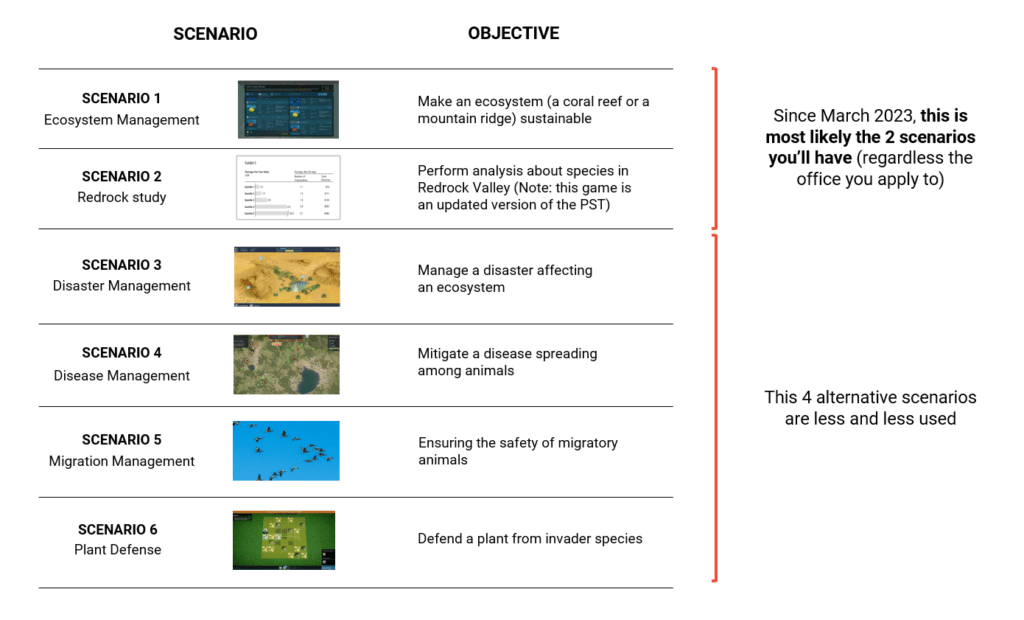
Preparing for the McKinsey Problem Solving Game
Here’s how you can prepare effectively for this distinct part of the McKinsey interview process:
1. Understand the Game’s Objectives: The game typically consists of two main scenarios: creating and protecting an ecosystem from external threats. The primary goal is to assess your decision-making skills, your ability to identify and prioritize information, and how you devise and revise strategies based on new information.
2. Develop Critical Thinking and Problem-Solving Skills: Since the game is designed to evaluate how you think rather than what you know, focus on enhancing your critical thinking abilities. Engage in activities that require strategic planning, pattern recognition, and logical reasoning. Chess, puzzles, and strategy video games can be particularly beneficial.
3. Practice with a simulation platform: Several platforms help candidates practice the mini-games like the original McKinsey Game. By utilizing these simulation platforms, candidates can familiarize themselves with the game’s mechanics, challenges, and time constraints. I recommend using the simulations at PSGSecrets.com. Francesco Rieppi, a former BCG consultant, has designed this platform and offers an incredible money-back guarantee if you don’t pass the Game.
4. Learn to Manage Your Time Effectively: Time management is crucial in the McKinsey Problem Solving Game. Practice working under time constraints to handle pressure and make decisions efficiently. Time-bound exercises can help you get used to thinking and responding quickly.
5. Stay Calm and Adapt: During the game, maintain a calm demeanor and be ready to adapt your strategies as new information becomes available. The ability to stay flexible and adjust to changing circumstances is a valuable trait that the game seeks to assess.
Acing GMAT-like Tests in Management Consulting Interviews
GMAT-like tests are increasingly used by consulting firms such as Bain and BCG as part of their recruitment process.
These tests assess a candidate’s analytical, quantitative, verbal, and logical reasoning skills, which are crucial for success in the consulting industry.
Let’s explore the 3 types of questions in GMAT-like tests:
- Numerical reasoning questions
- Verbal reasoning questions
- Logical reasoning questions
Acing Numerical Reasoning Questions
In numerical reasoning questions, you interpret data in tables and charts and solve mathematical problems. This typically involves basic arithmetic, algebra, and geometry.
These questions aim to test your ability to work with quantitative data.
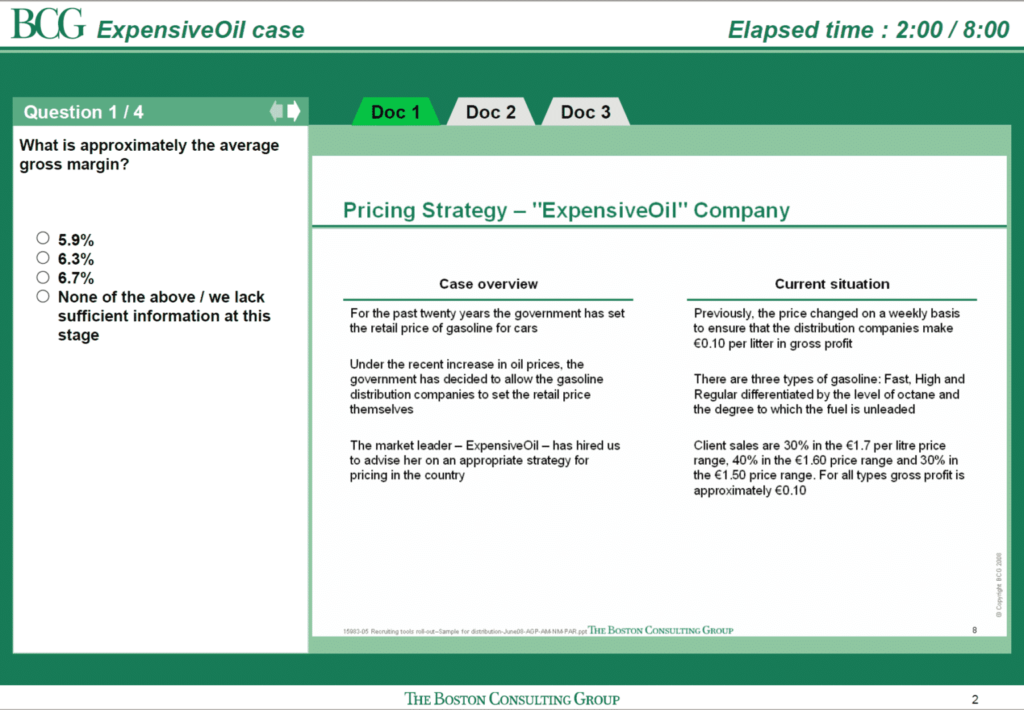
Acing Verbal Reasoning Questions
This type of question involves reading texts on various topics, followed by questions that test your understanding of the information’s content, inferences, and application.
You must determine whether a given statement is “True” or “False” or “Can’t say” based on the data within the text.
These questions assess your ability to interpret complicated written information.
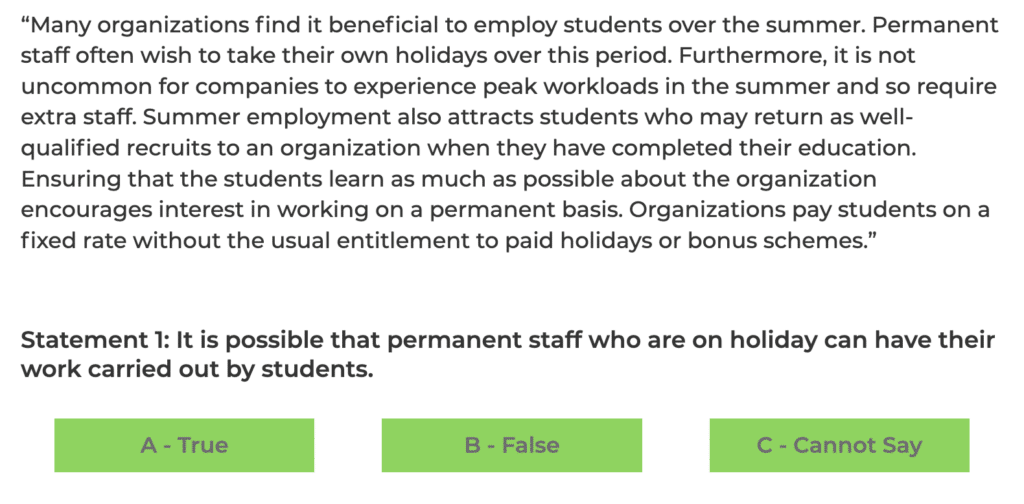
Source: SHL.com
Acing Logical Reasoning Questions
Logical reasoning questions require you to complete a logical sequence of shapes by identifying the sequence’s pattern.
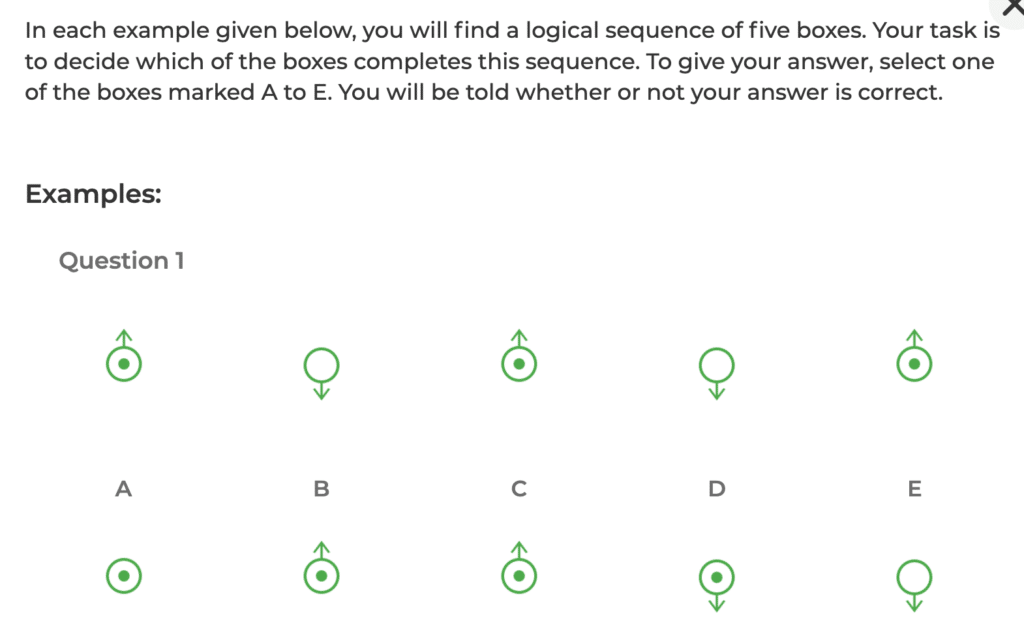
Source: SHL.com
Step-by-Step Preparation Plan for GMAT-like tests
Gather Study Materials:
Invest in or access test-specific preparation materials. This may include practice tests, study guides, and sample questions. Websites like GMAT Club and forums can provide GMAT resources and insights from those who have previously taken similar tests.
Develop Fundamental Skills:
Strengthen your mathematical and verbal reasoning skills, as these are critical for the numerical and verbal sections of the test. Use resources like Khan Academy for math refreshers and daily reading of complex texts for verbal improvement.
Practice with Sample Questions:
Regular practice with sample questions will help familiarize you with the test’s format and question styles. Focus on understanding how to interpret data quickly, make calculations, and analyze information.
Take Timed Practice Tests:
Take full-length, timed practice tests to simulate test conditions. This helps build stamina and teaches you how to manage time effectively during the test.
Analyze Your Performance:
After each practice test, carefully review your answers. Pay attention to where you excel and where you make mistakes. Understanding your weaknesses will allow you to focus your studies more effectively.
Develop Test-Taking Strategies:
Develop strategies for different questions, especially for handling complex or time-consuming questions. Learning techniques like skimming for critical information or eliminating wrong answers can improve efficiency.
By following these steps and dedicating sufficient time to each aspect of your preparation, you can enhance your performance on GMAT-like tests, increasing your chances of success in the consulting interview process and becoming a management consultant.
Passing behavioral assessment tests
Behavioral questions involve a range of statements and workplace situations.
The objective is to evaluate you on various personality traits and cognitive abilities.
To do so, you need to rate them on a scale (from “Least like me” to “Most like me”).
Then, the test evaluates how your personality traits and cognitive abilities compared to successful consultants.
Personal traits often tested include curiosity, decision-making, motivation, problem-solving, communication, etc.
Step 5: Crack the Consulting Case Interviews
Related article: The Ultimate Guide to Case Interview Preparation.
Now, it’s time to address the famous case interviews.
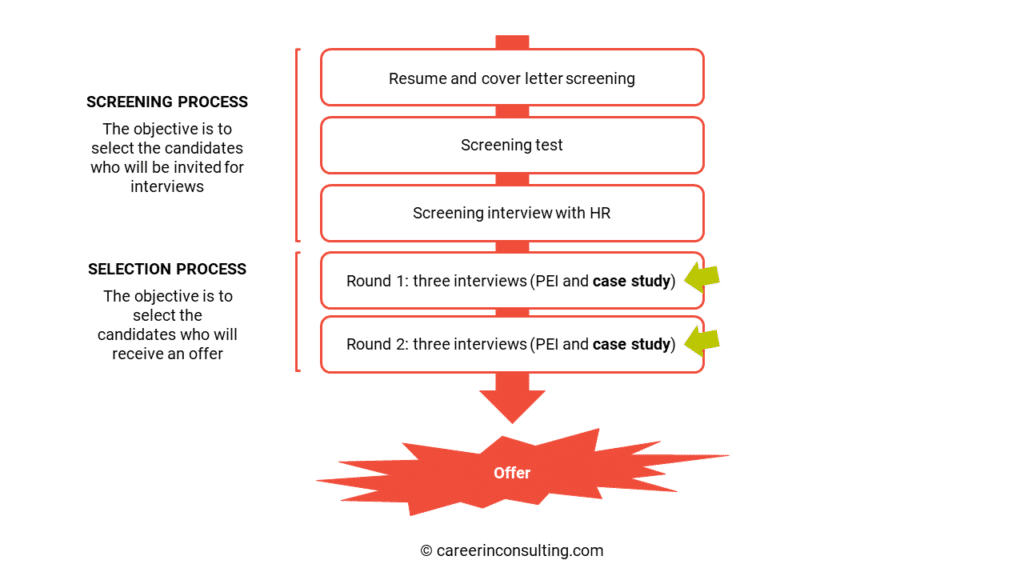
Starting with…
Understanding the Structure of Case Interviews
Case interviews are a critical component of the consulting hiring process.
They are designed to test your analytical thinking, problem-solving skills, and ability to handle real business issues.
Typically, a case interview involves the interviewer presenting a business problem.
Then, you are expected to lead the discussion by asking questions, analyzing data, and proposing solutions.
Common myth includes the belief that there is only one correct answer.
Here is what Bain & Company says:
In reality, interviewers are looking for logical thinking and structured problem-solving skills.

A typical case interview has four parts:
Framing the problem
Structuring an approach
Solving the problem
Presenting your solution
You can watch the following video to learn more about these four parts.
Practicing Common Types of Case Scenarios
Typical case scenarios include market sizing, profitability, M&A, or improvement of business processes.
Earlier in this guide, we discussed that management consultants solve various problems from any specific industry.
Well… this is the same for case interviews.
This makes case interview preparation overwhelming.
Luckily, case studies can be categorized into only four buckets:
“Fix something bad” problems
“Take a strategic decision” problems
“Improve a metric” problems
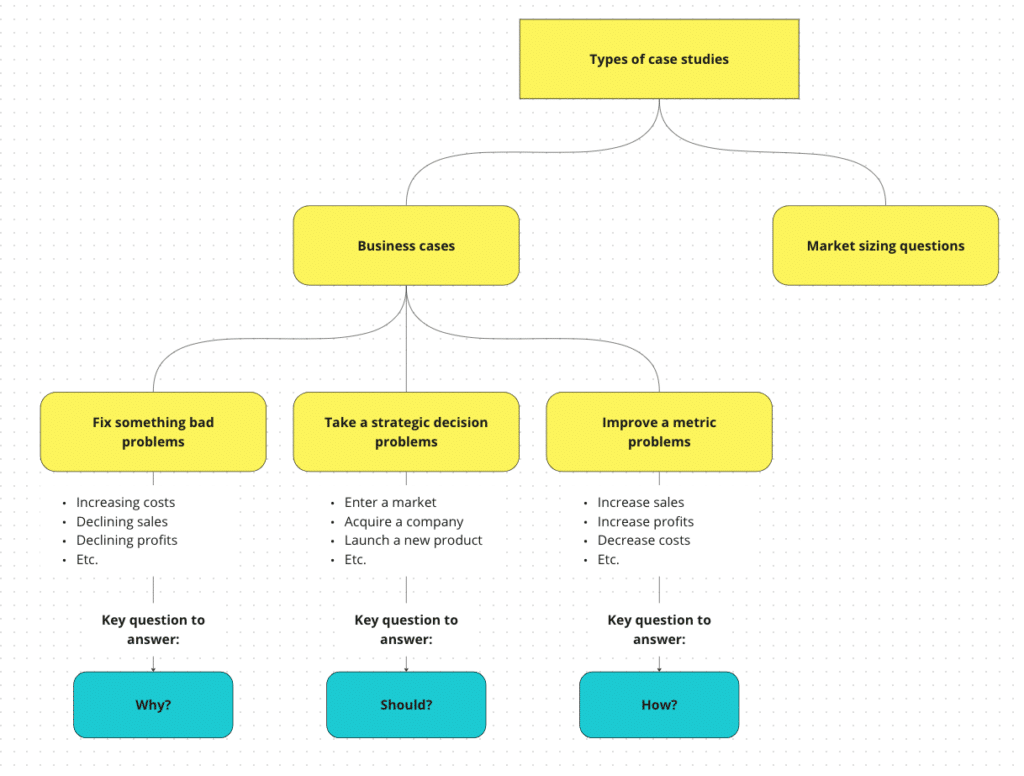
First, a market sizing question involves estimating the potential market for a product or service, often involving logical calculations and assumptions.
Example: estimate the number of bicycles sold in New York annually.
Second, a “fix something bad” problem involves understanding why a problem occurs (and eventually proposing a solution to fix the problem).
Examples: all the case studies with a client having a metric going in the wrong direction.
Declining profits or sales
Increasing costs
Etc.
Next, a “take a strategic decision” problem involves identifying and analyzing whether the conditions for making a decision are met. For instance, the conditions can be financial (making a profit) or operational (the client having the required resources).
Examples: all the case studies with a go/no-go decision.
Acquire a company
Enter a market
Launch a new product
Etc.
Finally, a “improve a metric” problem involves identifying and prioritizing ways to improve a metric.
Examples: all the case studies with a client willing to improve something.
Increasing sales or profits
Decreasing costs
Decreasing churn rate
Increasing productivity
Etc.
Essential Analytical Tools for Case Solving
The MECE Principle
Effective case interview performance hinges on your ability to break down complex problems into more manageable parts.
Specifically, a critical problem-solving principle used by management consultants (and assessed during your consulting case interviews) is called the MECE principle.
The MECE principle (mutually exclusive and collectively exhaustive) is a grouping principle for separating a set of items into subsets that are mutually exclusive (ME) and collectively exhaustive (CE).
Here is a first MECE example:
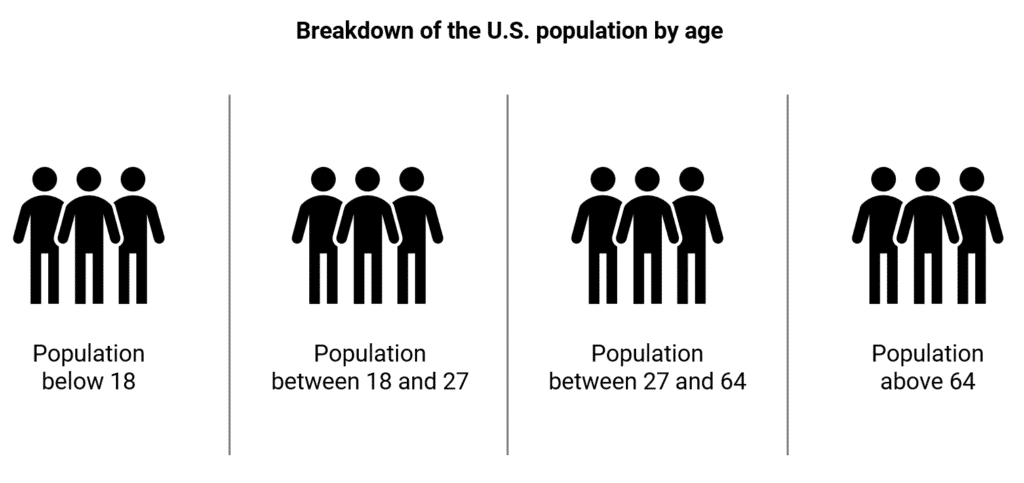
Learning to think in a MECE way is a critical part of your journey to secure consulting jobs.
Case interview frameworks
Related article: 11 must-know case interview frameworks.
When approaching case interviews, think of business frameworks like a writer’s toolkit.
Just as authors don’t start a novel from a blank page – They use outlines, character sketches, and plot structures – management consultants don’t tackle business problems without a structured approach.
Well-known frameworks, such as the 4Ps (Product, Price, Place, Promotion), Porter’s Five Forces, and the 3Cs (Company, Competition, Customers), provide a structure for systematically analyzing complex business problems.
Understanding these frameworks lets you quickly orient yourself within a case by identifying which aspects are most relevant to the problem.
For example, Porter’s Five Forces can help analyze an industry’s competitive dynamics, while using the 3Cs framework helps evaluate a company’s competitive advantage.
However, while these frameworks provide a robust starting point, they are not one-size-fits-all solutions.
Top consulting firms aren’t just looking for candidates who can memorize and apply these models; they seek individuals who can think beyond them.
In real-world consulting, problems often require bespoke solutions.
During your case interviews, demonstrate the ability to adapt standard frameworks to the nuances of the case or, better yet, develop unique frameworks tailored to specific challenges.
This will show your capability for innovative thinking and practical problem-solving.
This free training will show you how to improve your problem-solving skills.
Data Interpretation Skills
Related article: the ultimate guide to case interview math problems.
Data interpretation is a critical skill in management consulting, akin to a detective analyzing clues to solve a mystery.
In consulting, data often comes in various forms—market data, financial reports, consumer surveys—and your ability to interpret this data correctly can directly influence the strategic recommendations you provide to clients.
Understanding data isn’t just about reading numbers or graphs; it involves extracting meaningful insights to guide decision-making.
For instance, interpreting trend data could help a company understand whether a decline in sales is due to seasonal fluctuations or a more concerning, long-term shift in the market.
However, while solid data interpretation skills are indispensable, they alone are not sufficient to secure a position at a top consulting firm.
The best management consultants not only understand data but also know how to weave this understanding into the broader context of the business problem they are solving.
They can articulate why specific data points are critical drivers of change and how they relate to the strategic advice given to the client.
In your case interviews, showcase your ability to dissect the data and connect it compellingly to business outcomes.
This holistic approach to data interpretation will demonstrate that you are not just a number cruncher but a strategic thinker capable of guiding major business decisions.
Communicating Your Solutions Effectively
Communicating solutions clearly and persuasively is as important as solving the case in consulting.
To improve your communication skills (and learn how to speak like a consultant), I highly recommend buying the book “The Pyramid Principle” by Barbara Minto.
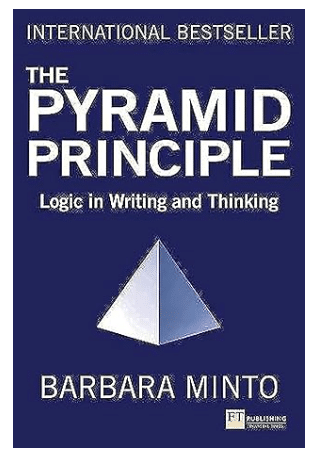
Communication is one of the 4Cs I discuss in my free case interview training.
Get 4 Complete Case Interview Courses For Free

You need 4 skills to be successful in all case interviews: Case Structuring, Case Leadership, Case Analytics, and Communication. Join this free training and learn how to ace ANY case questions.
Practical Exercises and Drills for Case Interview Prep
To excel in case interviews, structured practice through exercises and drills is essential.
You’ll find a library of over 280 free case examples on this page.
Step 6: Ace the Fit Interviews
Now, it’s time to get into the nitty gritty of consulting fit interviews.
Specifically, it’s time to prepare answers for three types of questions:
background question
motivation questions
experience questions
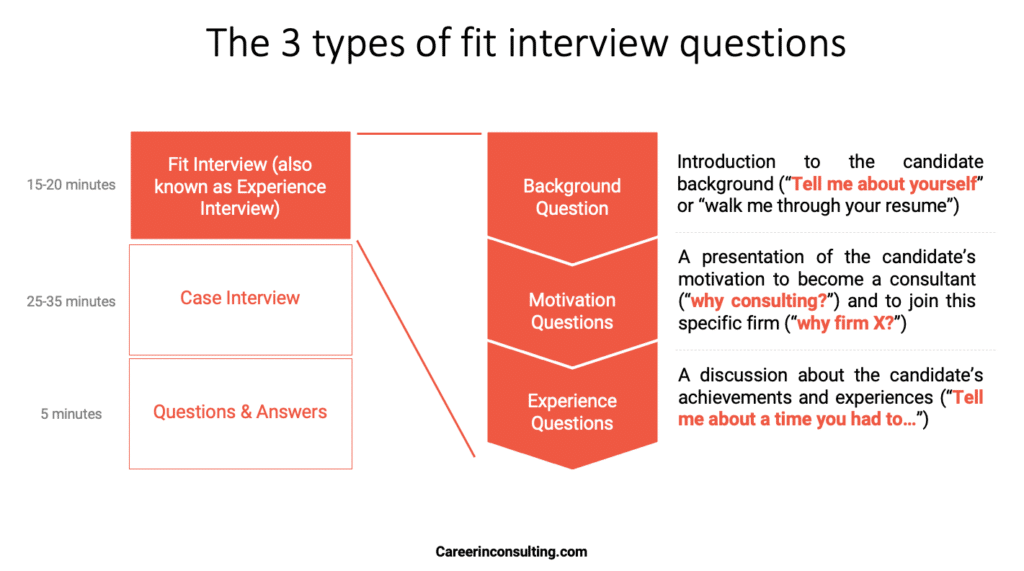
In this chapter, I’ll show you proven strategies for standing out during consulting fit interviews.
Specifically, you’ll see how to convey your motivation to become a consultant in a unique way and how to demonstrate you have essential skills, such as excellent communication skills or strong analytical skills, without sounding arrogant.
A final thought:
Preparing for fit interviews and meeting consulting firms’ expectations take time and effort.
So, do not overlook your fit interview preparation!
Mastering the Background Question
Related article: How do you answer “Tell me about yourself” in a consulting interview?
When preparing for “tell me about yourself” or similar background questions in consulting interviews, crafting a response showcasing how your professional journey aligns with consulting demands is crucial.
To do so, structure your answer like this:
Overview: Start with an overview of your educational background and work experience.
Positioning: On your resume, give a brief description of each position and highlight how your roles have directly contributed to organizational goals, such as improving profitability, enhancing efficiency, or driving growth. Use a high-level perspective to discuss your responsibilities and achievements, focusing on the strategic impact rather than daily tasks.
Bridge: End with a clear statement on why you’re transitioning to consulting, ensuring your reasoning is forward-looking and positively framed.
Here is a sample answer:
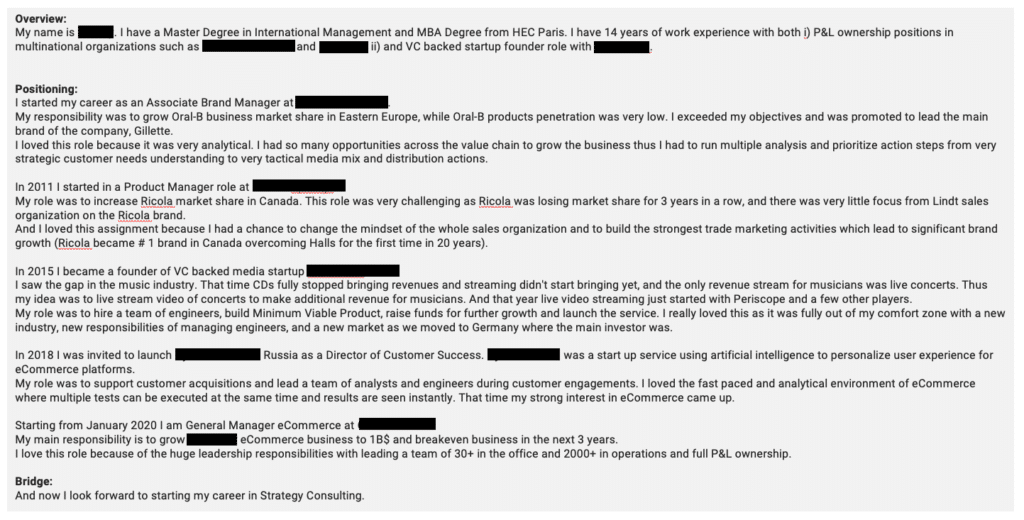
Background questions in fit interviews are your opportunity to make a strong first impression.
You can present a cohesive narrative of your education and explain how your professional experience and key achievements prepare you to become a successful consultant.
So don’t hesitate to over-prepare yourself for these background questions!
Excelling at Motivation Questions
Related articles and comprehensive guides:
Motivation questions are crucial as they help interviewers understand why you are interested in consulting and why you have chosen their specific firm.
Your answers should reflect your passion for consulting and your informed interest in the firm you are interviewing.
Here is how to answer motivation questions:
Give a list of specific reasons why you want to pursue a career in consulting and work for a firm. For instance, to answer “Why firm X?”, demonstrate your knowledge of the firm’s culture, values, and recent projects to show genuine interest
Show that it’s a thoughtful decision by clearly connecting the reason to an experience from your background.
However, management consultants do not like generic answers!
Indeed, a generic answer not only gives a poor impression but also shows that you haven’t done your homework, leading to rejection.
Therefore, do your homework: browse their websites, speak to consultants, and participate in events.
Example: Why BCG?
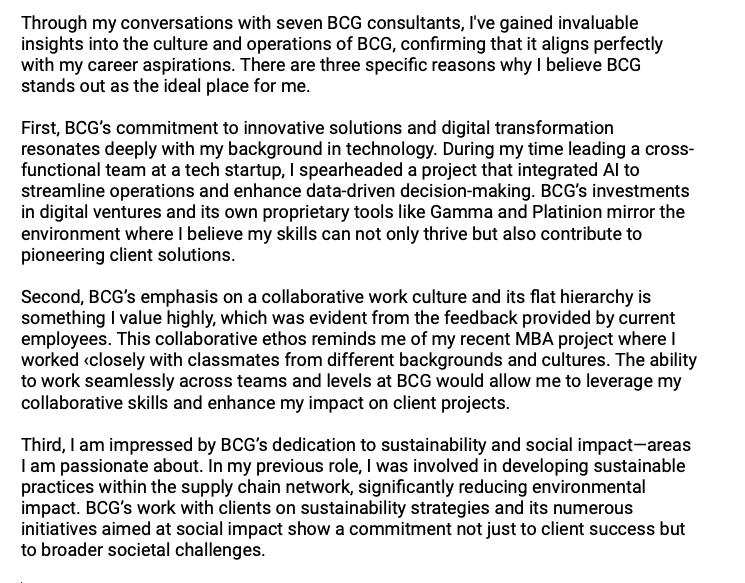
Navigating Experience and Personal Experience Interview (PEI) Questions
Related articles:
the STAR framework revisited for the consulting interview process
Experience questions, often emphasized in McKinsey’s Personal Experience Interview (PEI), require you to discuss specific experiences that showcase your consulting skills.
For instance, these questions assess qualities such as leadership, teamwork, entrepreneurial drive, and problem-solving.
Best practices for these questions include structuring your responses clearly and effectively using the STAR method (Situation, Task, Action, Result).
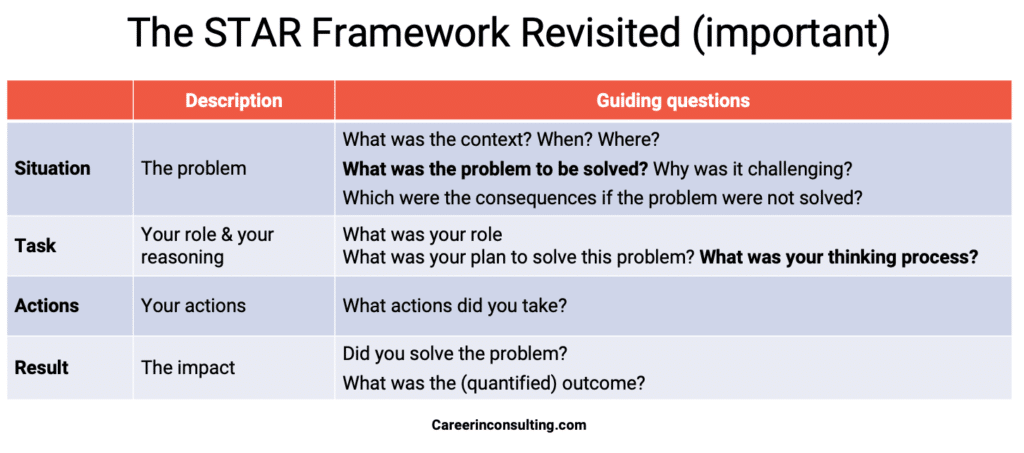
But focus on telling a story highlighting your contributions and the positive outcomes.
Discuss the challenges and obstacles you encountered while solving problems to tell a story.
Example: Describe a challenging problem you had to solve. What actions have you taken? What was the outcome of these actions?
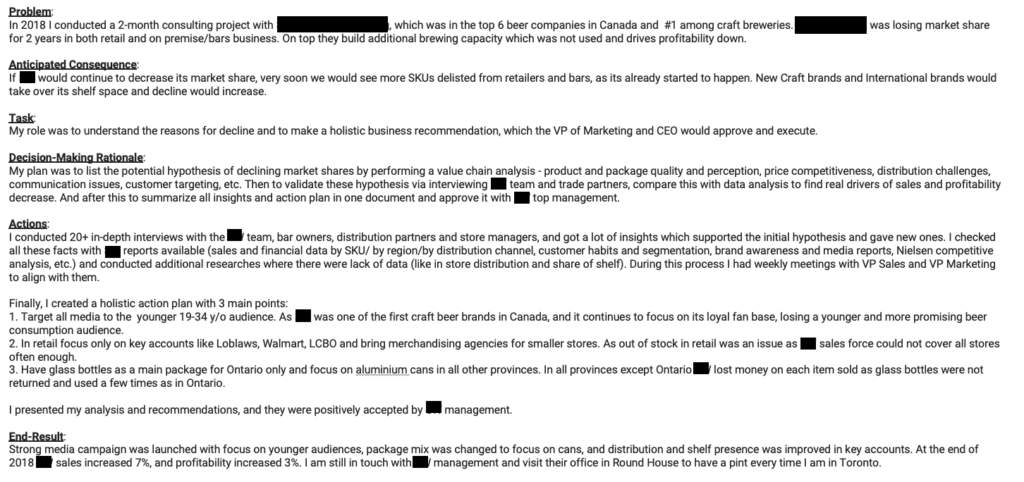
Remember that management consultants hear dozens of stories per year.
So make sure to make yours stand out!
Tips from Industry Insiders: Insights from McKinsey, BCG, and Bain Consultants
I had the chance to interview former clients with a great consulting career.
Watch the following videos to get insightful information from their experience.
How to get into consulting: final thoughts
I hope you enjoyed this step-by-step guide on how to get into consulting.
Securing a top consulting firm job requires strategic preparation, whether for consulting internships or full time jobs.
Throughout this article, we’ve outlined critical steps to prepare effectively for a career in consulting, emphasizing the importance of a compelling resume, a persuasive cover letter, robust networking strategies, and how to prepare for fit and case interviews.
Implementing the advice detailed in this guide will help you get a consulting job and become a management consultant.
Now, I’d like to hear from you: which step seems the most difficult for you?
Is it editing your resume?
Or the case interviews?
Let me know by leaving a quick comment below right now.
Get 4 Complete Case Interview Courses For Free

You need 4 skills to be successful in all case interviews: Case Structuring, Case Leadership, Case Analytics, and Communication. Join this free training and learn how to ace ANY case questions.

I recently got an offer from BCG in Singapore – thanks to the plethora of case interview resources and online materials from Carousell
Can you recommend any books / courses to Prepare for my Day 1?
Interviewer reminded me getting in is the beginning – and to expect a rough road ahead 😡